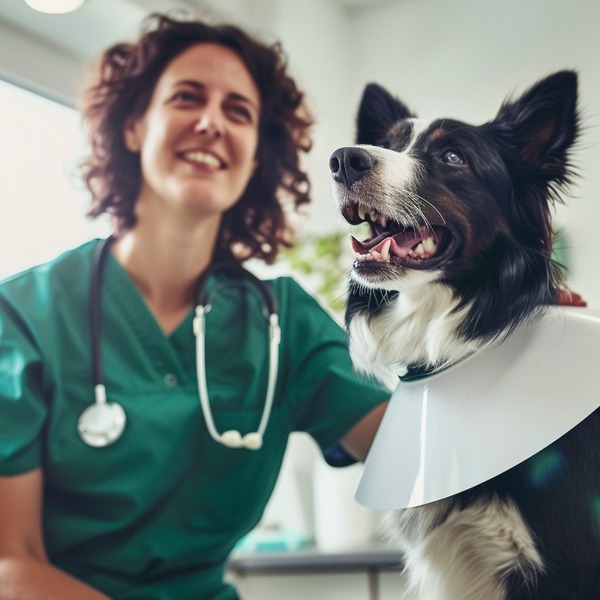
A routine vet exam is fundamental to maintaining your pet’s health and well-being. It’s not just a check-up; it’s an essential preventive measure to catch potential health issues early. During these visits, the vet assesses your pet’s overall health, examines physical conditions, and discusses any behavioral changes. Understanding what to expect can help ease your anxiety and ensure a smooth, stress-free experience for you and your pet.
It provides an opportunity for early detection of potential health issues and ensures that your pet is up-to-date on essential vaccinations and preventative care. Understanding what to expect during a routine vet exam can help you prepare and ensure a smooth visit for you and your pet.
1. Check-In and Initial Assessment
Upon arrival at the veterinary clinic, you will typically check in at the reception desk. The staff may ask for updated contact information and details about recent changes in your pet’s health or behavior. This initial assessment helps the veterinarian understand any specific concerns or issues that must be addressed during their pet wellness exams services.
2. Weight and Vital Signs
The first step in the examination process is often weighing your pet and taking their vital signs. This includes measuring their temperature, heart rate, and respiratory rate. These vital signs provide essential information about your pet’s overall health and can help detect any abnormalities or changes that may require further investigation.
3. Physical Examination
The veterinarian will conduct a thorough physical examination of your pet. This involves assessing various aspects of your pet’s health, including:
-
Skin and Coat: Checking for signs of parasites, skin infections, or abnormalities.
-
Eyes: Evaluating the eyes for signs of infection, injury, or other issues.
-
Ears: Inspecting the ears for signs of infection, inflammation, or excess wax.
-
Mouth and Teeth: It is essential to examine the teeth and gums for dental disease, tartar buildup, or other oral health issues. If you’re seeking specialized care, a cat & dog dentist in Perry, GA, can provide expert attention to ensure your pets maintain optimal oral health.
-
Heart and Lungs: Listening to the heart and lungs with a stethoscope to detect abnormal sounds or rhythms.
-
Abdomen: Palpating the abdomen to check for any unusual lumps or signs of discomfort.
4. Discussion of Findings
After the physical examination, the veterinarian will discuss their findings with you. They may highlight any areas of concern, suggest further diagnostic tests if needed, and provide treatment or follow-up care recommendations. This is an excellent opportunity to ask questions about your pet’s health and address any concerns you may have.
5. Vaccinations and Preventative Care
Your pet may receive necessary vaccinations or boosters to protect against common diseases during the routine exam. The veterinarian will review your pet’s vaccination history and ensure they are up-to-date on all required and recommended vaccines. Additionally, the vet will discuss other aspects of preventative care, such as parasite control, dental care, and nutrition.
6. Diagnostic Tests
Depending on your pet’s age, breed, and health status, the veterinarian may recommend diagnostic tests to assess their overall health. Standard tests, which you can find more details on veterinary laboratory facilities, include blood work, urine analysis, and fecal exams. These tests help detect underlying health issues that may not be apparent during a physical examination.
7. Discussion of Diet and Nutrition
The veterinarian will review your pet’s diet and nutrition during the exam. They may recommend diet adjustments based on your pet’s age, weight, and health status. Proper nutrition is crucial for maintaining your pet’s health and managing specific conditions.
8. Behavioral and Lifestyle Assessment
The vet may ask questions about your pet’s behavior, activity level, and lifestyle. This information helps assess whether your pet is experiencing any behavioral or health problems related to their lifestyle. The veterinarian can offer advice on behavior management and enrichment to improve your pet’s overall well-being.
9. Planning for Future Care
The veterinarian will help you plan for future care based on the exam findings. This may include scheduling follow-up visits, discussing needed treatments or procedures, and providing guidance on monitoring your pet’s health at home. Proper planning ensures that your pet receives continuous and effective care.
10. Payment and Follow-Up
After the exam, you will proceed to the reception desk for payment and to schedule any follow-up appointments if needed. The clinic staff will summarize the exam findings, vaccination records, and any instructions for post-visit care. Following the veterinarian’s recommendations or instructions ensures your pet’s ongoing health.
Final Thoughts
A routine vet exam is a comprehensive process that plays a crucial role in maintaining your pet’s health and well-being. Understanding what to expect during the exam, you can prepare effectively and ensure your pet receives the best care. Regular veterinary check-ups help detect health issues early, provide necessary vaccinations, and offer valuable advice on nutrition and lifestyle. Prioritizing routine exams is essential to responsible pet ownership, contributing to your furry companion’s long, healthy, and happy life.
